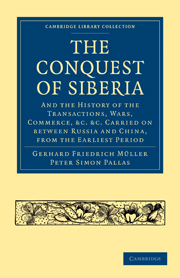 Conquest of Siberia
Conquest of Siberia CHAP. IV
Published online by Cambridge University Press: 16 May 2011
Summary
The merchants of Maimatschin come from the northern provinces of China, chiefly from Pekin, Nankin, Sandchue, and other principal towns. They are not settled at this place with their wives and families: for it is a remarkable circumstance, that there is not one woman in Maimatschin. This restriction arises from the policy of the Chinese government, which totally prohibits the women from having the slightest intercource with foreigners. No Chinese merchant engages in the trade to Siberia who has not a partner. These persons mutually relieve each other. One remains for a stated time, usually a year, at Kiachta; and when his partner arrives with a fresh cargo of Chinese merchandize, he then returns home with the Russian commodities.
Most of the Chinese merchants understand the Mongol tongue, in which language, commercial affairs are generally transacted. Some few indeed speak broken Russian, but their pronunciation is so soft and delicate, that it is difficult to comprehend them. They are not able to pronounce the R, but instead of it make use of an L; and when two consonants come together, which frequently occurs in the Russian tongue, they divide them by the interposition of a vowel. This failure in articulating the Russian language seems peculiar to the Chinese, and is not observable in the Calmucs, Mongols, and other neighbouring nations.
The commerce between the Russians and Chinese is entirely a trade of barter, that is, an exchange of one merchandize for another.
- Type
- Chapter
- Information
- Conquest of SiberiaAnd the History of the Transactions, Wars, Commerce, etc. Carried on between Russia and China, from the Earliest Period, pp. 72 - 84Publisher: Cambridge University PressPrint publication year: 2010First published in: 1842


